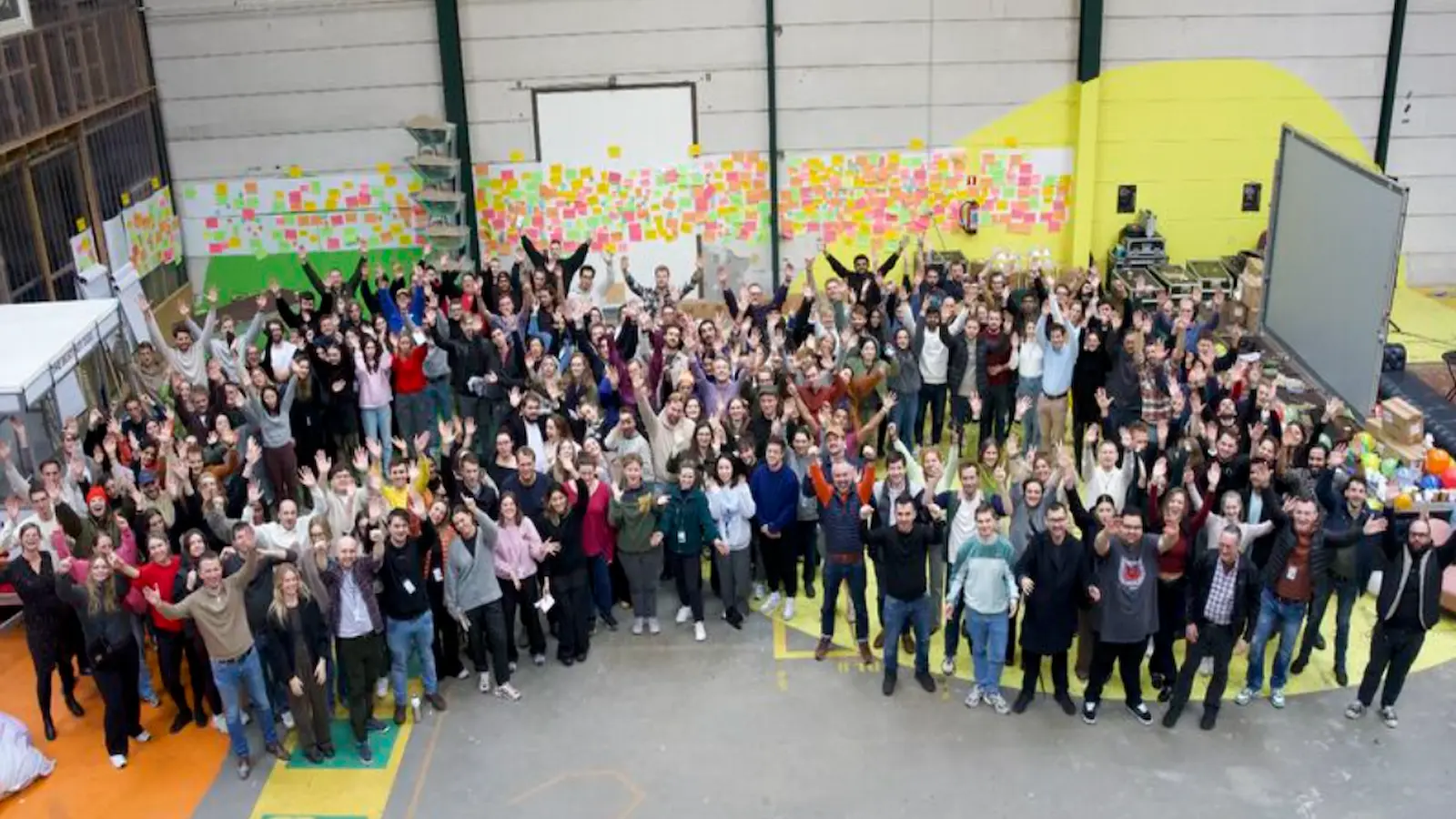At Exponent Partners, leadership wanted to build transparency and accountability into performance. Lattice equipped managers with tools for coaching and feedback, helping the team align more closely with mission-driven goals.
Lattice centralizes all our information into one easy spot that I can look at and take action on quickly. I’m in there daily, looking at our engagement scores, looking at my onboarding surveys and my off-boarding surveys, and thinking about the themes that we need to pull forward.

How Exponent Partners’ One-Person HR Team Increased Employee Wellbeing by 15%
Mandy Kutschied, the VP of Talent and Culture at mission-driven IT consulting firm Exponent Partners, is pretty busy.
As a one-person HR team, Mandy is in charge of the strategy and implementation of every aspect of talent management, including hiring, onboarding, learning and development (L&D), performance management, engagement, culture, communication, organizational design, compliance, benefits, and compensation.
Despite managing so much work on her own, Mandy has delivered transformational results over recent years. Overall pulse survey scores have gone from low-60s to 75% plus. Turnover is down to 3%.
We sat down with Mandy to understand how she and her leadership team have built such a strong company culture despite a small, 100% remote team with limited resources. Here are her top three tips:
1. Use data to spot issues and take prompt action.
As a one-person HR team, Mandy needs to be sure she’s spending her time where she can have the biggest impact. When she joined, Exponent Partners used turnover as its primary HR metric. The problem was that turnover was “such a lagging metric. If we only see an issue at the point of exit, we're not seeing the build-up. It didn’t make us very agile.”
When they moved over to Lattice, Mandy got far more real-time data on employee engagement. She runs a short Pulse survey every week. The survey results are broken down by themes impacting engagement (such as company outlook, development opportunities, wellbeing, and so on).
That way, not only can she track progress against ambitious KPIs (her target score for the overall pulse survey score is 75), she can also diagnose any issues as soon as they start happening.
For example, when they started using Lattice to track engagement scores in 2023, employee wellbeing was one of the lowest themes, with an average score between 55 and 60. So, Mandy sat down with her leadership team and put together an action plan:
- Scrap core business hours and move to fully flexible schedules.
- Re-introduce and emphasize the use of professional development funds for every employee and offer company-wide learning block times.
- Double down on management training and support.
The end result? Mandy told us that employee overall pulse survey scores are at 77 today and wellbeing is up over 70. ”It’s one of our higher-ranking themes now.”
It’s a great example of how to play to your strengths as an HR leader. If you’re a smaller organization, you may not be able to compete on salaries, but you’re far more able to be responsive to employee needs, Mandy points out.
“We're a small company with fewer resources. We're serving nonprofits — we're not making buckets of money. But what we can give our employees is the flexibility to come and go as needed, and to have good work-life harmony.”

Of course, this level of responsiveness will require easy access to people data. Small teams don’t have the time to dig through spreadsheets to surface this kind of information. Mandy told us this was a big plus point for Lattice:
“It centralizes all the information into one easy spot that I can look at and take action on quickly. I’m in there daily, looking at our engagement scores, looking at my onboarding surveys and my off-boarding surveys, and thinking about the themes that we need to pull forward.
Then I can show it to my leadership team and they can easily see the information too. It makes my job easier and scales my one-person team up.” As a bonus, this proactive, data-driven approach to surfacing and addressing issues has also kept turnover at an all-time low — current turnover is just 3%.
2. Offer your managers extra support.
Managers are the key to any successful people program, Mandy says. After all, they’re the ones meeting daily or weekly with the individual staff members. They’re the ones who create the employees’ lived experience.
Exponent Partners invests heavily in giving their managers the resources and tools they need to succeed. For instance, Exponent Partners’managers receive:
10-Month Management Training
All Exponent Partners managers receive extensive management training in 2023. The syllabus started with “self-awareness training — who you are, what are your strengths and weaknesses? Understanding yourself is really important as a first step for leaders,” Mandy says.
After self-awareness, they focus on business acumen: “Diving deep on our business processes, like, ‘What are our goals? What’s our approach to finance? How are all these pieces connected?’”
Finally, they work on performance management skills, such as:
- Coaching
- Goal-setting
- Improvement conversations
- Communicating expectations
As well as providing essential skills like the above, the training program also creates a community for the new cohort of leaders. Exponent Partners provides a chat group where managers can exchange questions and concerns with their peers and with Mandy.
Ongoing Support From HR
In addition to the training program and the company intranet, Mandy prioritizes offering ongoing support: “We're small enough that I can meet with all the people leaders regularly. I have frequent touchpoints with them to help if they have a question to talk through or if they don't know where to find a policy.”
Mandy also uses the data from engagement surveys to raise specific themes with individual managers. “For instance, if we're like, ‘Oh, gosh! Psychological safety has plummeted here,’ then we'll talk about it as a team.” Mandy will typically share some initial thoughts with the individual manager asynchronously and then brainstorm ideas on how the manager can address the issue in the coming weeks.
Tools and Templates
“Before Lattice, we were managing one-on-ones in Google Docs,” Mandy remembers. This made it harder for busy managers to prepare, schedule, and conduct ongoing performance conversations, so they tended to happen less often. It also meant that Mandy and the leadership team had no real insight into whether those one-on-ones were even happening.
Lattice’s 1:1 Meetings feature has one of the highest adoption rates, Mandy says, because it genuinely made managers’ lives easier. The agenda templates give structure to the conversations, and it’s quick to carry items that you don’t get to over onto the agenda of your next meeting.
Plus, the leadership team can easily check that managers really are meeting with their teams regularly, which creates some accountability.
3. Level up your performance reviews.
Mandy and the team at Exponent Partners are big believers in the importance of making performance reviews actionable and effective. She shared a few guidelines for improving the review process in small businesses:
- Involve key stakeholders when you’re developing your review process.
When she introduced Lattice’s Performance module, she asked all the managers for advice and input. “Get your managers involved early and often,” Mandy advises. That way, they created a consistent process that was also flexible enough to incorporate different management styles. Make sure to be open to feedback yourself, Mandy says. While you may have your own opinions about how performance reviews should go, she found that listening and adapting to manager feedback meant that she got more buy-in for the final process.
- Be clear and consistent about your evaluation criteria.
According to Lattice research, just 18% of employees confidently know what’s expected of them or how their work is evaluated. For Mandy, being clear and upfront about performance metrics is fundamental. “If you don't have those clear standards, your performance reviews can become muddled, subjective, and inconsistent.” Lattice can get you started with some handy templates, but Exponent Partners decided to create their own competency matrix: “We needed to use our own language for people to get it and see what it looks like in action and in behavior.”
- Offer developmental feedback.
Mandy suggests that performance reviews shouldn’t just be about performance—they should be an opportunity to discuss development opportunities and share learnings. This might require some management training to ensure that managers are comfortable sharing constructive feedback with their direct reports.
- Centralize performance information.
“Nothing should be a surprise” during performance reviews, Mandy says. And that means that you’ll need to tie your reviews into your other performance management systems. For example, Exponent Partners uses Lattice to link employees’ biannual formal assessments with their quarterly goals. Managers also have their notes from ongoing one-to-ones in the same centralized platform. “They don't have to be looking through Google documents and trying to remember where everything is.”
If you’d like to learn more about how Lattice can help your small HR team scale your impact, we’d love to hear from you. Click here to set up a demo.
Takeaways
- Lattice helped Exponent Partners get the people data they need to proactively improve company culture, boost wellbeing and keep turnover low.
- Giving managers the tools, templates and training they need to succeed is key to Exponent Partners’ thriving company culture.
- Lattice Engagement surveys give the Exponent Partners HR and Leadership teams a clear top-level goal to work towards, despite limited resources and time.
- Exponent Partners uses Lattice’s Performance module to make performance reviews actionable and build a culture of continuous improvement.


.webp)

%20(1).jpg)

